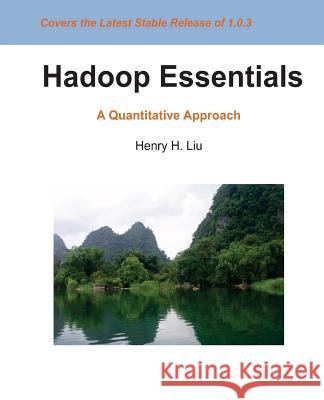Hadoop Essentials: A Quantitative Approach » książka
Hadoop Essentials: A Quantitative Approach
ISBN-13: 9781480216372 / Angielski / Miękka / 2012 / 356 str.
This textbook adopts a unique approach to helping developers and CS students learn Hadoop MapReduce programming fast. Rather than filled with disjointed, piecemeal code snippets to show Hadoop MapReduce programming features one at a time, it is designed to place your total Hadoop MapReduce programming learning process in a common application context of mining customer spending patterns ensconced in large volumes of credit card transaction record data. Precise, end-to-end procedures are given to help you set up your Hadoop MapReduce development environment quickly on Eclipse with Maven on Mac OS X. Step-by-step procedures are also given on how to set up a four-node Linux cluster at minimum so that you can run your MapReduce programs not only in local mode on your Mac OS X machine but also in fully distributed mode on a real cluster. In fact, all MapReduce programs presented in the book have been tested and verified in local mode and on such a Linux cluster. This textbook mainly focuses on teaching Hadoop MapReduce programming in a scientific, objective, quantitative approach. Rather than heavily relying on subjective, verbose (and sometimes even pompous) textual descriptions with sparse code snippets, this textbook uses Hadoop Java APIs, Hadoop configuration parameters, complete MapReduce programs and their execution logs and outputs to demonstrate how Hadoop MapReduce framework works and how to write MapReduce programs. Specifically, this text covers the following subjects: *Introduction to Hadoop *Setting up a Linux Hadoop Cluster *The Hadoop Distributed FileSystem *MapReduce Job Orchestration and Workflows *Basic MapReduce Programming *Advanced MapReduce Programming *Hadoop Streaming *Hadoop Administration No matter what role you play on your team, this text can help you gain truly applicable Hadoop skills in a most effective and efficient manner. The book can also be used as a supplementary textbook for a distributed computing or Hadoop course offered to upper-division college CS students.
Zawartość książki może nie spełniać oczekiwań – reklamacje nie obejmują treści, która mogła nie być redakcyjnie ani merytorycznie opracowana.











